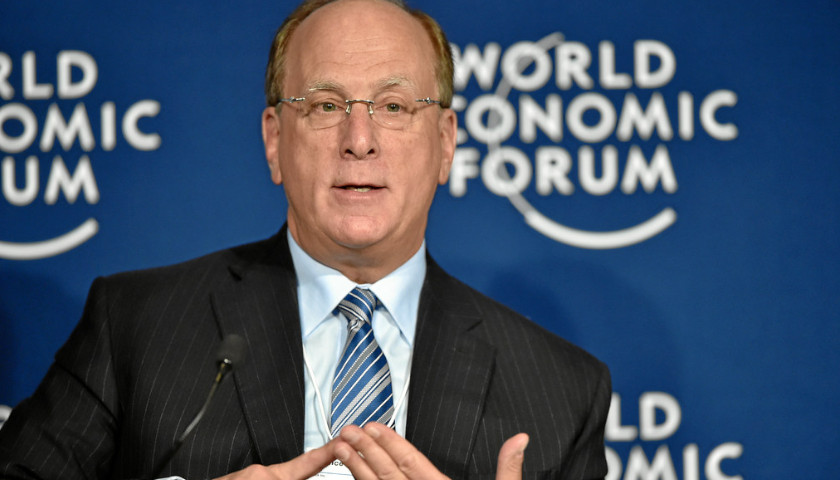by David Blackmon
The big news in energy this week is that BlackRock CEO Larry Fink says he is no longer using the term “ESG” in his business communications. Even more, Mr. Fink is now “ashamed” to be a participant in the debate on the issue. At least, that’s what he initially said on Sunday to an audience at the Aspen Ideas Festival, where he was a speaker.
“I’m ashamed of being part of this conversation,” Fink said as quoted by Axios. But almost as soon as he made the admission, Fink took it all back when pressed by his session’s moderator. “I never said I was ashamed,” he said, even though he had just actually said that very thing. “I’m not ashamed. I do believe in conscientious capitalism.”
Finally, apparently realizing he’d been caught in self-contradiction, he added, “I’m not going to use the word ESG because it’s been misused by the far left and the far right.” Here we see Mr. Fink trying to have things both ways: He strongly believes in the philosophy that he played such a big role in building across society, but thinks he can somehow expunge that role by not using the ‘E’ ‘S’ or ‘G’ word.
In engaging in this brief, self-contradicting conversation in Aspen, Mr. Fink simply reflected the strategy employed by his firm in communications with officials in Texas and other conservative states that have enacted measures in recent years designed to curb the influence of ESG investor firms in their state’s economies.
The ESG (Environment, Social and Governance) investor community, a tightly coordinating group of huge investment houses who regularly boast of controlling many trillions of dollars in capital, demands that corporations seeking to borrow funds to finance projects prove they are behaving properly or the capital will not be available. Those preferred behaviors include cutting emissions, hiring employees with the preferred identities and invoking compensation and incentive plans that meet tight specifications, among many other things. The ESG philosophy now has created such a perverse set of requirements and measures that tobacco company Philip Morris received a higher ranking than Tesla according to metrics published this year by S&P Global.
 When officials in Texas noticed the destructive influence this philosophy was having on the state’s energy industry, the legislature passed a 2021 law enabling the state Comptroller’s office to deny any investment firm that discriminates against energy companies the ability to invest in state pension funds. While Comptroller Glenn Hegar developed guidelines under the law, BlackRock responded in a May 13, 2022 letter that “we do not boycott energy companies,” going on to boast about several specific investments it had made in the sector. Taken together, the investments listed totaled just over $1 billion, a paltry sum compared to the trillions in capital controlled by BlackRock alone.
When officials in Texas noticed the destructive influence this philosophy was having on the state’s energy industry, the legislature passed a 2021 law enabling the state Comptroller’s office to deny any investment firm that discriminates against energy companies the ability to invest in state pension funds. While Comptroller Glenn Hegar developed guidelines under the law, BlackRock responded in a May 13, 2022 letter that “we do not boycott energy companies,” going on to boast about several specific investments it had made in the sector. Taken together, the investments listed totaled just over $1 billion, a paltry sum compared to the trillions in capital controlled by BlackRock alone.
But this pushback by BlackRock fell on deaf ears, and three months later, Mr. Hegar released an initial list of 10 investment firms he planned to sanction, with BlackRock among them. “The environmental, social and corporate governance (ESG) movement has produced an opaque and perverse system in which some financial companies no longer make decisions in the best interest of their shareholders or their clients, but instead use their financial clout to push a social and political agenda shrouded in secrecy,” Hegar said in a written statement.
Perhaps what was really at play this week in Aspen was a case of Mr. Fink becoming concerned about the investing public awakening to the pernicious impacts the ESG philosophy, reflected this year in a rising tide of anti-ESG shareholder proposals filed at corporate annual meetings. Axios reported in April that the number of such proposals has doubled over the last two years and more than tripled since 2019.
This is a backlash that was inevitable as individual investors and the public at large began to make the connections between the ESG philosophy, lower returns in their portfolios and higher costs for energy and all manner of consumer goods. Mr. Fink now wants to have things both ways, but expressing feigned contriteness and then immediately taking it all back probably won’t do the trick.
– – –
David Blackmon is an energy writer and consultant based in Texas. He spent 40 years in the oil and gas business, where he specialized in public policy and communications.
Photo “Larry Fink” by The World Economic Forum. CC BY-NC-SA 2.0.





